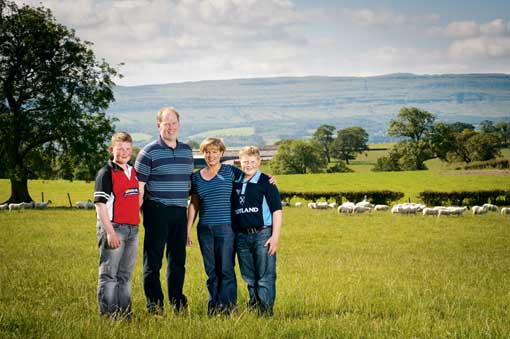FW Awards 2011: Sheep farmer of the Year finalist – Douglas Graham

Douglas and Lynda Graham
Mains of Burnbank, Blairdrummond, Stirling
Motivating the next generation to stick with farming is something Scottish farmers Douglas and Lynda Graham take very seriously.
The couple from Mains of Burnbank, Blairdrummond, Stirling have introduced their two sons John, 14, and James, 13, into the business early so they can handle the technical and physical side confidently. The boys are already having success demonstrating the results of all their hard work at local shows.
Together they own 1000 ewes and a herd of 100 pedigree Limousin cows on 400 acres at Mains of Burnbank and rent 300 acres nearby at Munnieston. The farms are located in a less favoured area and produce premium quality finished and breeding livestock.
The sheep flock comprises 570 Blackface ewes, with 200 bred pure and 370 crossed with Bluefaced Leicester tups, 400 Mule ewes crossed with Suffolk and Texel tups and a pure-bred flock of 30 Bluefaced Leicester ewes owned by their young boys.
All Mule ewe lambs, except those retained for breeding, and their prime lambs are sold through Caledonian Marts where Lynda works as an office manager four days a week. This connection has provided invaluable information to the business about what stock is selling well and potential pricing. Lambs are ready to market most weeks from July to December .
The sheep flock of 1,000 ewes take priority on this all grassland unit and they follow the pedigree Limousins on a rotational grazing system.
The stocking rate of 1.5 ewes per acre allows Douglas Graham to make the most of grass and home grown forage while controlling the amount of concentrates bought. Supplementary feeding comes from ad-lib molasses licks and some hay when there is snow. The purchased feed costs are around £6 per ewe based on the flock using 8-10,000 litres of molasses and hay.
The couple run a closed flock to minimise disease risk and their vet costs per ewe are around £5.
They have also introduced chicory to their grass reseeding programme to control the worm burden in the flock and also help cut worm drench costs. The financial performance of the flock is good with the 1,000 ewes sowing £103 per ewe gross margin based on last year’s sales.
Colin Macphail, a senior agricultural consultant for the Scottish Agricultural College, handles most of the paperwork for their farm business and serves as an adviser. But he says:
“I am probably learning more off Douglas than him from me at the moment, because he has great attention to detail and is always looking at every little bit of the business to increase efficiency.”
In June 2010 Douglas and Lynda Graham hosted the Scotsheep event and welcomed 8000 people on to the farm in one day.
Preparation for the event meant that about £20,000 had to be spent on improving buildings, fencing and gates.
“We were proud that the NSA had their event here and people could see the quality of our stock,” said Douglas. “It was a lot of work putting the event on but it helps our reputation and certainly helps us get higher prices.”
The technical skills of the family are also being applied to a SAC initiative to train 90 agricultural consultants on the farm. The Grahams are not in an environmental scheme and they do believe that the single farm payment is critical to the future survival of the sheep sector.
The outlook for Douglas is positive as long as prices remain high as there are fewer sheep around these days and less people with the technical skills to deliver high levels of performance.
Farm facts
High performance in less favoured area
1,000 ewes and 100 pedigree Limousin cows
Turnover £270,000 Profit £10,000
The judges liked
Good succession with teenage sons already involved
Tight control of costs
Using marketing intelligence to inform sales policy
2011 Farmers Weekly Awards
